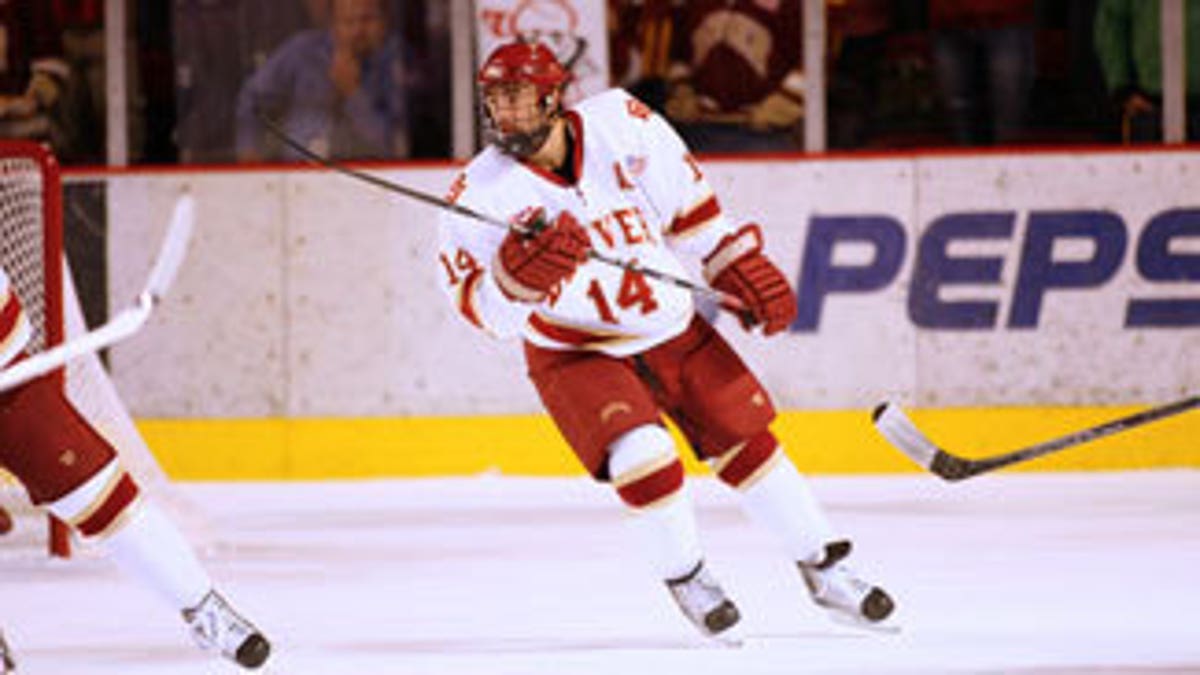
The University of Denver's Jesse Martin loves practice probably a lot more than his teammates. He probably enjoys going to class more, as well.
Only four months ago, Martin wasn't sure he ever would be able to partake in what his teammates and fellow students would consider normal, everyday life. Instead, he was going through surgeries to prevent him from becoming permanently paralyzed and that hopefully would allow him to walk again.
On Oct. 31, 2010, Martin was blindsided by a hit from North Dakota player Brad Malone as he was skating up ice out of the Denver zone. He had just passed the puck and the next thing he remembers is laying motionless on the ice unable to move his extremities and having his whole life flash before his eyes as he waited 25 seconds for trainers to arrive.
"I remember pretty much everything about the play and minus about 10 seconds, I remember the whole process of laying there on the ice not knowing if I would ever walk again and that my life as I know it probably had completely changed and was gone," Martin recently told NHL.com. "You have your whole life flash between your eyes and even though it was only 25 seconds before the trainers started doing their thing, it felt like eternity."
Martin had suffered a broken neck and later would learn through tests and numerous surgeries that if not for a bone chip that was jarred loose in the hit and was lodged between his C1 and C2 vertebra, his spine and brain stem would have been severely damaged. He not only would have been paralyzed but could have died, as 98 percent of people that suffer injuries similar to Martin's don't survive.
"You hear that and you basically feel like you hit the jackpot 100 times over," Martin said. "To know how close I was to possibly dying -- not just not walking -- I mean, I am not a religious person, but I feel like my faith grew after that. I had a whole new outlook on whatever would come next and I realized how lucky I was."
Martin also realized that his hockey career most likely was over at that point, but that became secondary as he finished his surgeries and embarked on months of rehabilitation. During his recovery, Martin spent time at the Craig Hospital in Denver. It was there that the 22-year-old Martin had what he considered a pivotal moment in his recovery.
"I was going through some really tough times and feeling sorry for myself at the time," he said. "Here I am in this place where these patients are basically there with the same or very similar injuries and they can't walk and are in much worse shape than me. So you end up feeling bad for them, obviously, and thinking that they're looking at you and saying, 'Why can't we do the things he's doing? Why did he survive and walk?'
"So it's hard because I am there doing normal stuff. And seeing their families looking at me wondering maybe why their family member is drinking out of a straw and I am eating normal. So I would basically go back to my room and cry and feel guilty. It was really hard until this one patient who was injured swimming at the beach, waving to his wife and was knocked over by a wave. He fell over, broke his C2 on the sand and was a quadriplegic right on the spot. He came over to me and said, 'I understand we have the same injury and I just want you to know that everyone in here looks at you as a sign of hope and an inspiration that we can recover, too.' So we both started crying and basically my physical therapy became counseling."
From that moment on, however, Martin has approached his therapy and life reinvigorated. He is at games and practices to support his team and he is living like a college student again, with the exception of having to wear a soft and hard collar to protect his neck. He accepts the reality that playing hockey no longer is an option, but he is at peace with that and is happy just to be there with and for his teammates.
"For me, I made the decision really when I was still in the hospital that hockey wasn't really my goal now and it was more to live a normal life and be happy that I had that opportunity," Martin said. "I still see myself as a leader on the team and it's my job to still be there to support them. It's hard, for sure, but it is also helping me get through this and live my life."
Martin said he doesn't blame Malone or anyone or anything else for where he is in life now.
"Hockey is a fast sport and a physical sport and these things are going to happen. I knew that risk playing," he said. "Do I think the hit I took or these other ones could be prevented? Yes, but it's tough to change a culture and the game. Being physical is part of it and I think maybe it's just being more aware out there is what's needed. Knowing how dangerous it can be and maybe factoring that into your thinking on the ice."
Martin hopes that happens but for now he is happy to be living as normal a life as possible.
"I was lucky and I know it, so I am going to live my life to the fullest and try to help others that go through similar injuries and maybe weren't as lucky as me," Martin said. "It's amazing I've come this far this quickly and I'm thankful for that."
